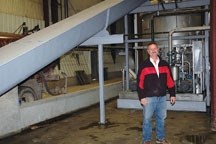A hearing will determine whether Alberta Environment’s approval of an expansion of a compost operation west of High River addresses its potential impacts on the environment.
The Environmental Appeals Board (EAB) has scheduled a hearing at the Foothills Centennial Centre in Okotoks on Feb. 9 and 10 in response to concerns from area residents over a proposal by EcoAg Initiatives to expand its composting operations. The hearing comes after attempts to negotiate a solution between residents and the owners of the facility, located at Tongue Creek Feeders west of High River on Secondary Highway 543, were unsuccessful.
Alberta Environment approved an expansion of an existing composting operation in June 2009 and seven neighbouring landowners subsequently appealed this decision.
Residents’ concerns include odor and impacts on water sources in the area.
“We just want the operation to comply, as it should,” said area resident Marcia Jeffers.
However, EcoAg owner Peter Morrison said he hopes the hearing will address everyone’s concerns and allow the project to move forward.
“We’re very concerned of what the perception is of what the facility is,” he said.
The company has been doing composting outdoors since 1994. The expansion will see the processing of manure brought indoors. A 2007 public notice on the facility stated it will have a capacity of 635 tonnes per year.
Morrison said the building is designed to recover nutrients used in farming.
He said they will be ready to test the facility in February.
By moving the process indoors, Morrison said it will address concerns over odors coming from the operation. As well, he said the process does not use any ground water and there will not be any wastewater produced from the facility.
He said the facility has already gone through two extensive peer reviews, it’s heavily regulated and is watched by provincial and federal agencies.
Morrison said they will be able to capture the methane gases given off by the composting process and use it in their feedlot operations.
“The methane will be used in our loaders and trucks and it will be used to heat the buildings,” he said.
As well, he said they will be able to reduce the moisture in their final compost product to reduce freight costs.
EcoAg and area residents entered mediation over the dispute in October 2009.
EAB lawyer Gilbert Van Ness said EcoAg and the appellants drew up a memorandum of understanding outlining a number of steps to take place, including the creation of a community advisory panel and the completion of an environmental impact assessment.
Van Ness said they were unable to agree on or complete the initiatives in the memorandum of understanding.
“They were unsuccessful on reaching agreements on those issues and as a result after quite a bit of work trying to carry out the terms, it was determined mediation would not be successful,” he said.
Van Ness said the EAB’s preference is to reach a resolution through mediation and this is achieved about 84 per cent of the time. When mediation is unsuccessful, the next step is to proceed to a hearing.
He said the environment minister makes the final decision based on the board’s final report.
The EAB can recommend the approval be supported as is, suggest changes to address concerns or recommend the approval be overturned. The board has 30 days to submit its final report to the minister and the final decision is typically received two months after the hearing.
EcoAg also faced a number of enforcement orders from Alberta Environment earlier this year.
The company was exceeding the amount of waste authorized for its facilities and accepting materials not set out in the provincial code of practice for compost facilities. The company was also working without an operations plan and did not report any contraventions in its operations.
Under the enforcement order, the company was required to develop and implement a groundwater monitoring plan, prepare an operation plan and an odor and dust mitigation plan.
Alberta environment spokesperson Carrie Sancartier said the company has addressed all issues in the order and the ministry is currently drawing up its final report on the matter.




